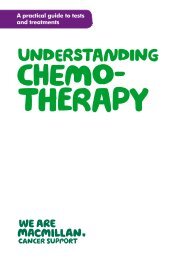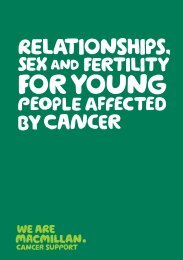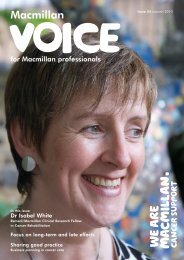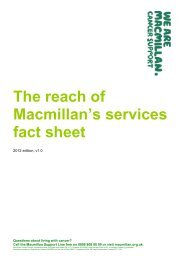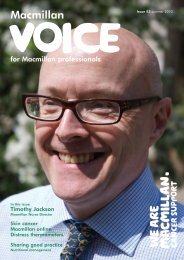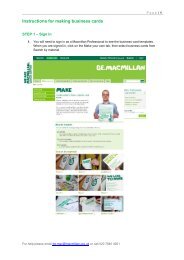Download PDF here - Macmillan Cancer Support
Download PDF here - Macmillan Cancer Support
Download PDF here - Macmillan Cancer Support
- No tags were found...
Create successful ePaper yourself
Turn your PDF publications into a flip-book with our unique Google optimized e-Paper software.
Primary care Featurechronically ill. Such patients arelikely to be treated by many differentprofessionals. Understanding theseroles and referral pathways hasprovided us with an insight into whysystems don’t always work efficientlyand helped us identify w<strong>here</strong>improvements could be made.Meeting different team membershas also given us the opportunityto share information and providetraining. We have facilitated interactiveteaching sessions for GPs in each ofthe five localities that make up theAneurin Bevan Health Board (ABHB).The sessions were run jointly withpalliative care consultants, basedaround the key theme of ‘qualitystandards for end-of-life care’.We used these sessions to discusshow to:• identify patients – what are the keysigns of deterioration, what factorspredict prognosis• use the integrated care priorities• control symptoms• discuss sensitive topics with peoplewho are chronically ill.We have supported these sessionswith the production of templates tohelp professionals capture relevantinformation in palliative care meetings.Such information is invaluable intracking and monitoring patients,particularly if their symptoms requirefurther treatment.Access to careWe have complemented our trainingscheme with specific projects in theABHB area aimed at improvingaccess to appropriate care andpromoting advance care planning.Our objective is to ensure health andsocial care professionals are wellinformedabout the patients’ historiesand current situations, so patients donot need to repeat this informationwhen encountering someone new.For example, we have initiated aproject to enable people to be caredfor in their preferred place of care andto reduce unnecessary admissions tohospital at the end of life. The projectfocuses on understanding why hospitaladmissions occur and on developingprotocols to enable people to accessappropriate care. In particular, wewill focus on people in residential andnursing homes to emphasise how theyshould be offered every opportunity tobe involved in planning for their futureregardless of diagnosis.‘Our first year in posthas been both busy andchallenging – not everythinghas gone perfectly, but wehave found the role hugelyrewarding and the earlyresults encouraging’Care at homeA second project has focused onthe care of people at home. Wehave looked at improving two criticalareas – ensuring people have accessto the right medicine at any time ofthe day and that medical professionalscan be quickly brought up to speedon a patient’s history should anemergency occur.With the first area, we recognisethat the needs of people in palliativecare change very quickly and theymay require immediate access tonew medicines outside of the normalworking day, when these are leastlikely to be available. We haveworked with other professionalsto launch ‘Just in case’ boxes, whichprovide medicine in anticipation ofa prescription being written, avoidingthe need to visit pharmacies lateat night.The second area is based on theneed to share important information.We have designed an advance careplanning communication tool. This isa simple document that can be usedto record important information aboutthe patient and their future wishesand decisions. It is then stored inthe patients’ notes and also faxed todoctors working in different sectors,eg hospital and out-of-hours service.We have also been helping topromote the ‘Message in a bottle’scheme. This specially designed bottleis stored in the fridge and containsvital information for any healthprofessionals visiting the home. Thiscould be about medicines, medicalnotes or in some cases resuscitativepreference. A sticker on or near thefront door alerts visitors of the bottlein the fridge, which can be particularlyimportant in an emergency situationor when the patient may not beable to respond.Moving forwardWhile our first year has presentedmany challenges, it has also provedthat although the health service iscomplex, improvements to patientcare can be made by simple, smallchanges. We are excited to move onto different projects that will involveassisting in the development of cancerservices and cancer survivorship.These roles would not exist without<strong>Macmillan</strong>’s invaluable supportand funding.Related informationFor more about <strong>Macmillan</strong>'sprimary care community, visitmacmillan.org.uk/pcclwww.macmillan.org.uk/macvoice 21



